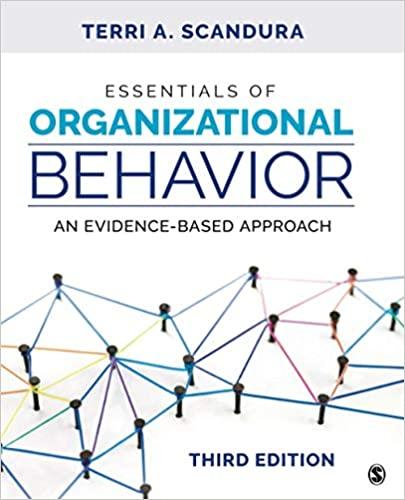The future of work may look very different from how it does today. The economy has had
Question:
The future of work may look very different from how it does today. The economy has had a significant influence on OB in recent years. The gig economy (also known as freelancing) has arisen as a major workforce trend. Why do they call this “gig”? The gig economy is a free-market system in which organizations of all sizes hire independent contractors instead of full-time workers. This describes the emerging work model where freelancers are employed and paid per job (or gig), often through a website or app such as Uber and Lyft drivers. Another example of gig employment is when research participants are paid by answering surveys at online marketplaces such as MTurk. Gig work is performed on a fixed-term contract basis on demand. The gig economy has grown rapidly in the United States, from 10% of the work done in 2005 to 36% in 2019 (this is 55 million gig workers). An industry report provided by Upwork and the Freelancers Union found that gig workers are working a lot—a total of one billion hours per week in 2018. It is projected that the gig economy will be 50% of the workforce by 2027 if the trend continues. The gig economy is growing because it benefits both organizations and workers/contractors. Organizations value the flexibility of hiring workers on a contract or part-time basis to meet their workloads. Organizations save costs in terms of fringe benefits provided to full-time workers—a study conducted by MetLife reported that only 4% of gig workers received employerpaid medical insurance and only 5% had an employer-sponsored retirement plan. Gig workers benefit from flexible work hours and the ability to take vacations when they want. Some gig workers are supplementing their income with a second job. Another challenge for gig employees is that they must be disciplined and they must market themselves. To thrive in the gig economy, these workers must be proactive and resilient in managing their careers. Working in the gig economy may not be for everyone. The work is often transient, and workers may move from job to job without building work experience since they perform many different jobs that may not be related. In addition, the work is often performed alone without connections to others. Some feel like strangers to other coworkers since they are not permanent employees. For example, a survey conducted by Deloitte showed that nearly half of gig workers feel lonely and disconnected from other people. Are gig workers happy? Despite the anxieties of being lonely and not having medical and retirement benefits, the study conducted by MetLife found that almost half (47%) of gig workers reported that they gain fulfillment and self-worth from freelancing. Forty-five percent of them said they have more job satisfaction compared to their prior non-gig work. The study also supported the idea that the gig economy will continue to grow: 67% of fulltime employees in the survey stated that they are interested in gig work instead of their current jobs. Another study conducted by Statista found that 81% of part-time gig employees enjoy “being their own boss” and being able to set their own work schedules. They also value being able to work from anywhere—you often see gig workers in coffee shops working on their laptop computers. In sum, gig workers value freedom and the ability to do work that is consistent with their values—where they want and when they want............
Discussion Questions
1. Discuss the influence of technology on the rise of the gig economy. What other forces do you think have given rise to this level of gig workers?
2. Do you agree that the trend of gig workers will continue to grow? Discuss the pros and cons of gig work for
(a) organizations and
(b) employees.
3. Would you consider gig work instead of full-time employment after you graduate? (If you are currently employed full-time, would you switch?) Explain your reasons.
Step by Step Answer:

Essentials Of Organizational Behavior An Evidence-Based Approach
ISBN: 9781544396781
3rd Edition
Authors: Terri A. Scandura





